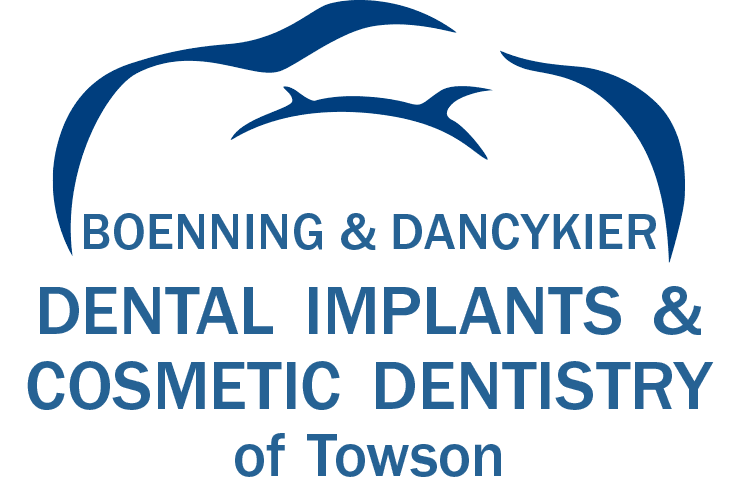If your gums bleed after brushing or flossing, you may have gingivitis. Gingivitis, or gum inflammation, is a predecessor of periodontitis, or gum disease. Tobacco use, genetics, poor oral hygiene, and certain medications are risk factors for developing gum inflammation. As inflammation progresses, deep pockets can form in the gums and cause gum recession.
Prosthodontists Dr. Keith Boenning and Dr. Nathan Dancykier help treat patients with bleeding gums in Towson, MD. Gingivitis is a common dental problem that our dentists can easily reverse. Please get in touch with Dr. Boenning and Dr. Dancykier at the first sign of bleeding and irritated gums.

Signs of Gum Disease
Apart from bleeding gums, there are several symptoms of periodontitis to be aware of, including:
- Red, swollen, or tender gums
- Bad breath (halitosis)
- Gum recession
- Tooth sensitivity
- A change in the bite
- Loose teeth
In more serious cases of gum disease, the gums can detach from teeth and cause tooth loss. It is important to get gum disease treatment earlier than later, as periodontitis can progress quickly.
Gum Disease Treatment
You can prevent gum disease with regular dental appointments and a diligent oral hygiene routine. Scheduling regular oral health and wellness visits at least once every six months can prevent gum disease from progressing. Our dental hygienists provide dental cleanings that scrape away any plaque or tartar buildup. Dr. Boenning or Dr. Dancykier can also examine your smile to see if there are any developing problems.
If you have already have symptoms of gum disease, we may recommend scaling and root planing, grafting, or surgery. Visit our dentists to remove infection and improve your tooth and gum health.
Scaling and Root Planing
Using a special dental tooth, your dentist will gently remove the infection from beneath the gums. Next, they will smooth out the tooth roots to help the gums reattach to your teeth.
Bone and Gum Grafting
If gum disease has led to bone loss or receding gums, we can help restore them. A bone graft will help build back up the bone density in your jaw. Gum grafting will help restore the gum tissue. For severe cases of gum disease, we offer surgical gum procedures.
How can I prevent bleeding gums?
To prevent bleeding gums and gum disease, you must take good care of your teeth and gums. Daily brushing and flossing, as well as dentist appointments every six months, are key to proper oral hygiene. During your routine visits to the dentist, we will thoroughly clean your teeth to remove hidden plaque and tartar.
Daily at-home care will remove the plaque that is constantly developing in your mouth. Living a healthy lifestyle will also help. We recommend eating a healthy diet and refraining from using any form of tobacco. Tobacco products will damage your gums and increase your chances of developing gum disease.
Bleeding Gums Treatment FAQs
You probably have some questions about how to treat bleeding gums. We have answers.
When is bleeding gums an emergency?
Bleeding gums may be an emergency if the bleeding is excessive, persistent, and painful. Furthermore, if bleeding persists and won’t stop after a few minutes then seek emergency dental care.
A dentist can order to rule out more serious conditions like cancer or infection. In some cases, the cause of the bleeding may be easy to treat. However, bleeding gum can also indicate a more serious dental condition requiring immediate attention.
How do I stop my gums from receding anymore?
To prevent further gum recession, gently brush your teeth with a soft toothbrush. Avoid brushing your teeth aggressively, as it can damage your gums. You should also floss once per day to remove plaque buildup. Additionally, you should visit your dentist regularly for checkups so they can monitor the condition of your gums.
Do I need antibiotics for bleeding gums?
Antibiotics are not usually necessary for bleeding gums. If bleeding is because of mild gum disease or poor oral hygiene, you can improve your brushing and flossing habits to resolve the issue. However, if your dentist may prescribe antibiotics if he determines that an infection is causing the bleeding. Consult our dentist or periodontist for proper diagnosis and guidance.
Will my teeth fall out with receding gums?
No. Your teeth will not fall out with receding gums. However, receding gums can increase your risk of eventual tooth loss if you do not treat it or improve your dental hygiene. Visit a dentist at least every six months for professional cleanings to maintain healthy gums.
Why is my tooth sensitive with no cavity?
Tooth sensitivity without a cavity can result from various causes. It could be because of worn tooth enamel, receding gums exposing the tooth root, a cracked or chipped tooth, or even teeth grinding (bruxism). To reduce sensitivity, use a desensitizing toothpaste and avoid consuming overly acidic food and drinks. See our dentists to determine the exact cause of your tooth sensitivity and get appropriate treatment.
What is the best treatment for bleeding gums?
The best treatment for bleeding gums starts with maintaining good oral hygiene. Brush your teeth twice a day using a soft-bristled toothbrush and flossing daily. Moreover, you should consider using an antiseptic mouthwash to kill any bacteria causing gum irritation or infection.
Also visit your dentist for regular exams and cleanings. Finally, your gums could be bleeding because of an underlying issue such as gum disease. In that case, your dentist may recommend additional treatments like deep cleanings, scaling and root planing, or gum surgery.
Treat bleeding gums and other common symptoms of gum disease in our Towson dental office. Call Dr. Boenning and Dr. Dancykier at 410-324-2294 for comprehensive care. You can also schedule an appointment with our dentists on our website.
